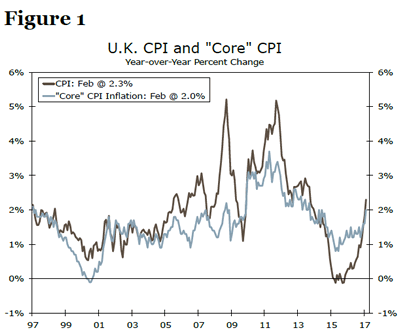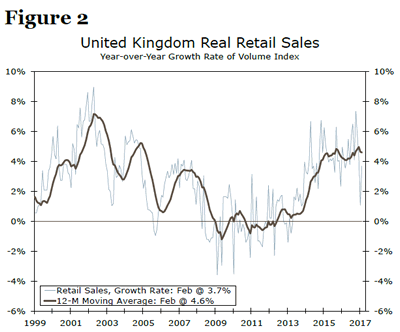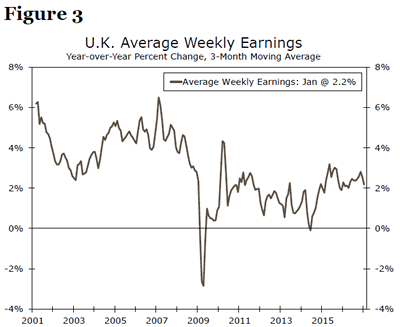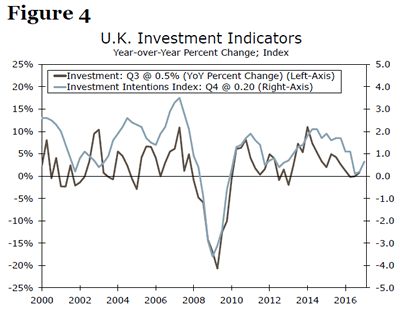Real retail spending in the United Kingdom rose more than expected in February. That said, growth in retail spending has clearly downshifted in recent months. Higher inflation, which currently exceeds the Bank of England’s two percent target, is eroding real income growth.
For now, the Bank of England appears willing to allow inflation to exceed its target for an undisclosed period of time. We believe that the Monetary Policy Committee will refrain from hiking rates through at least the end of the year.
Economic data that were released this week in the United Kingdom contained both good news and bad news. Let us start with the positive. Real retail spending rose 1.3 percent in February relative to the previous month. Not only did the outturn materially best the consensus forecast, but it more than reversed the 0.3 percent decline that was registered in January.

That said, the pace of retail spending in the United Kingdom has clearly downshifted over the past few months (Figure 2). If real retail spending in March remains unchanged at February’s level, then spending will have contracted about 1 percent (not annualized) on a sequential basis in the first quarter. In Q4, real spending grew 1.2 percent despite the large decline registered in December. Consequently, spending momentum was weak entering 2017.

The culprit behind the spending slowdown seems to be the rise in inflation in recent months. As shown in Figure 1, the overall CPI inflation rate rose to 2.3 percent in February, the highest inflation rate in more than three years. Not only does the rise in the British inflation rate in recent months reflect the rebound in energy prices that has occurred over the past year, but it also reflects the effects of the sterling depreciation that has pushed up import prices. With growth in average weekly earnings remaining more or less constant in recent months (Figure 3), the rise in inflation has eroded growth in real disposable income. Consequently, spending growth has slowed.

The simultaneous downshift in economic momentum and the rise in inflation present somewhat of a quandary for the Monetary Policy Committee (MPC) at the Bank of England. Does the MPC ease policy to shore up spending, does it raise rates to fight higher inflation, or does it keep policy on hold pending further developments? For now, the MPC has opted to remain on hold. In the statement that was released after its March 15 policy meeting, the MPC acknowledged that inflation likely will rise to 2-¾percent in coming months, which is well above its 2 percent target, before gradually drifting back toward target. For now, the MPC is willing to allow inflation to exceed its target for an undisclosed period of time. The MPC said that it could tighten policy in coming months if inflation moves even higher than it forecasts. Conversely, it could ease policy further if economic activity slows more than expected. In the meantime, the MPC appears to be in wait-and-see mode.
Prime Minister May is widely expected to formally trigger Article 50 of the Lisbon Treaty next week, thereby starting the two-year negotiating window that the United Kingdom and the European Union have to settle the terms of their divorce. Growth in investment spending has slowed over the past year or so, and a survey of investment "intentions" remains at a low level (Figure 4). The uncertainty that the Brexit negotiations will engender could weigh on investment spending going forward, giving monetary policymakers another reason to refrain from hiking rates. In our view, the MPC will indeed keep rates on hold through at least the end of this year.

